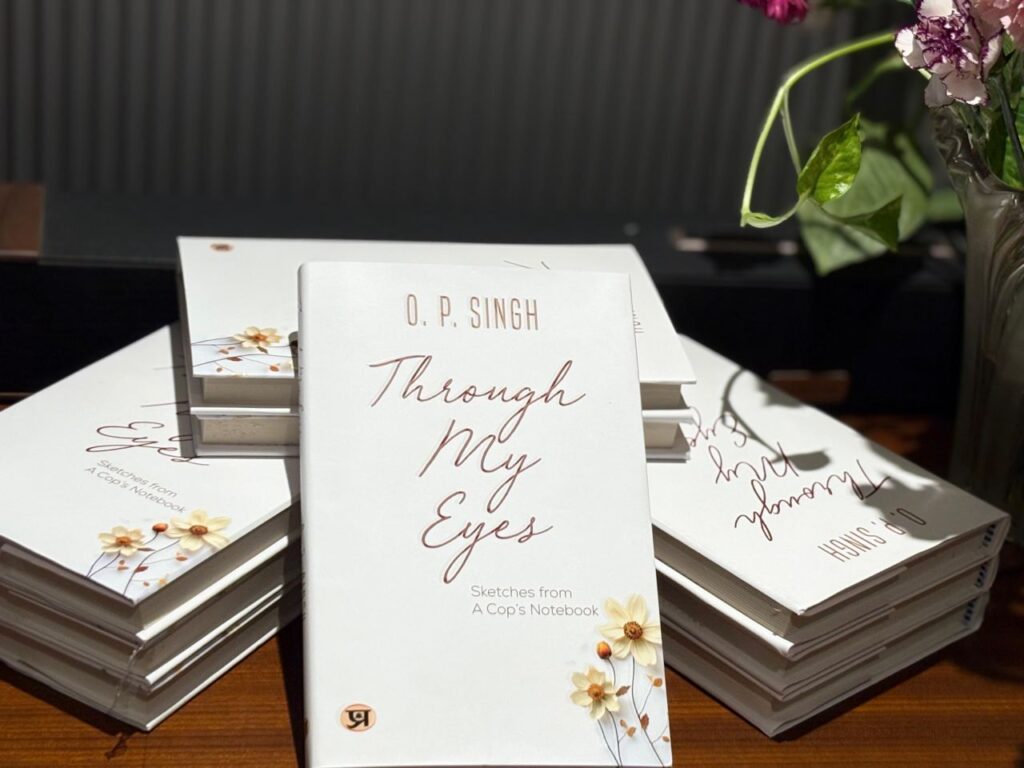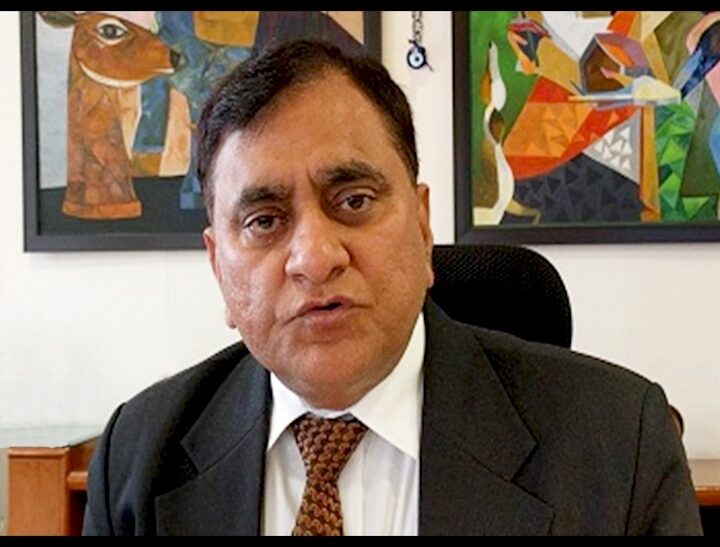Through My Eyes by Om Prakash Singh, former Director General of Police, Uttar Pradesh, is a powerful memoir that offers an unflinching look into the nuanced realities of policing in India. Published by Prabhat Prakashan, the book draws deeply from Singh’s own journey, navigating the fraught terrain of honour killings, caste-based discrimination, militancy, and other deeply rooted social challenges—often within some of the nation’s most vulnerable communities.
With evocative storytelling, Singh captures the moral tightrope that law enforcement officers must walk—balancing the firm hand of justice with the human face of empathy. In recounting moments where he stepped beyond bureaucratic limits to uphold justice, he underscores the ethical courage that true policing demands. One particularly haunting narrative, centred on a tragic honour killing, lays bare the internal conflicts and societal pressures that police officers often confront.
Rather than adopting an investigative tone, Singh opts for a raw, unvarnished style—honest, direct, and profoundly human. He dismantles prevailing stereotypes about the police, instead portraying officers as agents of change who, despite institutional limitations, strive to act with compassion, fairness, and integrity. Through My Eyes is more than a memoir; it is a testament to the transformative potential of responsible, empathetic policing. It resonates with law enforcement professionals, aspiring officers, policymakers, and everyday readers alike, offering a rare window into how public trust can be rebuilt.
In an exclusive interaction with The Interview World, OP Singh shares the personal motivations behind writing Through My Eyes, emphasizes the critical issues spotlighted throughout the book, and explains who stands to gain most from its message. He also introduces the concept of “silent victories” in policing, those uncelebrated yet deeply impactful moments that define the true essence of public service. Below are the key insights from this compelling exchange.
Q: What was the driving force behind writing Through My Eyes?
A: This book brings together a collection of personal anecdotes that reveal the deeper contours of my life and the experiences that defined it. Following the overwhelming response to my memoir Crime, Grime and Gumption (2024), readers urged me to go further—to share the unguarded, thought-provoking, and often surprising episodes that shaped my journey. This volume is my answer to that call.
Spanning from my formative years to my time in the police service, these stories breathe life into encounters with political leaders, pivotal professional moments, and contemplations on human nature. They go beyond mere chronology. Instead, they distil the emotions, insights, and lessons that each chapter of life left behind.
Told with unflinching honesty and a disarming simplicity, the narratives reflect a life marked by purpose, resilience, and a relentless pursuit of growth. Some stories are light-hearted; others probe the more profound dimensions of existence. But each one serves as a mirror—offering readers not only a window into my world but also a chance to see echoes of their own.
Above all, this book celebrates the quiet power of lived moments—their ability to teach, transform, and illuminate. It is a tribute to the richness of the everyday and the meaning we derive when we pause to reflect.
Q: How would you articulate the foremost challenges you’re determined to thrust into the spotlight?
A: During my posting in Lucknow, I confronted a host of pressing challenges that afflicted the local population. This book lays bare the systemic injustices suffered by individuals stripped of control over their own legal battles. More importantly, it delves deep into the brutal realities of honour killings, entrenched caste discrimination, rising militancy, and unresolved public grievances.
These are not abstract issues—they are lived experiences. Each account is drawn from my direct engagement with the most vulnerable members of society. I did not allow the constraints of time, geography, or jurisdiction to deter me. Instead, I pushed boundaries, often stepping beyond conventional limits, to pursue justice wherever it was denied. Through these pages, I offer not just stories, but a testament to the relentless pursuit of what is right.
Q: Who stands to gain the most from reading this book, and in what ways?
A: I believe this book will strike a deep chord with the men in khaki. It doesn’t indulge in glorifying the top cop as a symbol of unchecked power. Instead, it sheds light on how authority, when guided by purpose and conscience, can serve the greater public good.
For the everyday reader, the book offers a compelling shift in perspective—one that reaffirms how an officer’s integrity and goodwill can quietly transform countless lives. Moreover, for those who dismiss Indian policemen as power-driven or authoritarian, these pages reveal a rarely seen truth: the lived reality of officers bound by the rule of law, yet determined to serve with humanity.
Through each story, I invite readers to witness the other side of the badge—the one defined by empathy, resilience, and an unwavering commitment to justice. These are not tales of bravado, but of silent courage. And they remind us that behind the uniform are individuals who genuinely care.
Q: Can you explain the idea of ‘silent victory’ in policing, and why it’s significant?
A: Not all victories roar with sirens or glitter with medals. Some arrive quietly—like a mother’s relieved breath when her missing child is found nibbling sweets outside a corner shop. Or the silent nod from a shopkeeper who, for the first time in months, wasn’t harassed for money. These are policing’s unseen triumphs—daily, unheralded, and often unacknowledged.
Policing, after all, isn’t always a high-octane chase or the takedown of a crime syndicate. That’s the version Hollywood sells. Reality is less cinematic, yet far more consequential.
Consider Constable Mishra. For seven years, he has stood watch at a modest railway crossing. He hasn’t neutralized a terrorist or stormed a den of criminals. But no child has slipped beneath his barrier. No commuter has stumbled on his watch. He’s helped an elderly man cross the tracks over 300 times. His record? Zero accidents. No spotlight. No accolades. Just lives quietly protected—day after ordinary day.
Now meet Sub-Inspector Neelam. She spends her mornings defusing neighbourhood disputes that would give seasoned diplomats pause. Her tools? Patience, a steady flow of chai, and a mental archive of domestic squabbles—like who failed to return a borrowed pressure cooker. Locals call her “Neelam Didi.” Unorthodox, yes. But perhaps the highest praise a community can bestow. She hasn’t filed a single FIR in the last three flare-ups—because she resolved them before paperwork became necessary.
Then there’s the beat constable who noticed a teenager lingering by an ATM three evenings in a row. Suspicion didn’t drive him—curiosity did. A conversation revealed the boy had lost his job and couldn’t bring himself to tell his family. No crime was committed. No arrest was made. But the constable connected him with an NGO. The ATM remained safe. The boy stayed out of trouble. A crisis averted—without drama or noise.
No major breakthrough. No headline. Just another quiet win.
The truth is, good policing often goes unseen because its success lies in prevention. There’s no camera crew for a riot that never sparked. No journalist files a story titled: “City Sleeps Peacefully, Again.” In fact, the more effective the system, the less attention it draws.
So one must ask: if a tree falls in the forest and no one hears it, did it make a sound? And if a cop prevents a crime that never happened, does it still count?
We believe it does. Every single time.
Behind the statistics, beneath the uniforms, within the reams of FIRs, lie human stories. Officers who lent their own money to send a stranded worker home. Colleagues who took extra shifts so one of them could attend his daughter’s wedding. SHOs who saved vulnerable women’s numbers and checked in regularly—not out of protocol, but out of habit.
And then, there’s the victory no one witnesses: a cop returning home at midnight, peeling off a sweat-soaked uniform, and knowing—deep in their bones—they made a difference, even if no one ever learns their name.
Yes, the system isn’t perfect. Mistakes happen. Some officers fall short of the ideals they wear on their sleeves. And when that happens, they must be held accountable. But in our critique, let’s not lose sight of the silent good—the steady, uncelebrated acts that hold the fragile balance between order and chaos.
The world doesn’t collapse each day. That alone is proof that someone, somewhere, quietly held the line.
So next time you pass a cop scribbling in a battered notebook, standing alone under a flyover, or sipping tea at the edge of a bustling fair—remember: they may not have cracked a high-profile case that day. But they may have prevented something far worse.
And in the world of policing, that quiet victory is more than enough.









